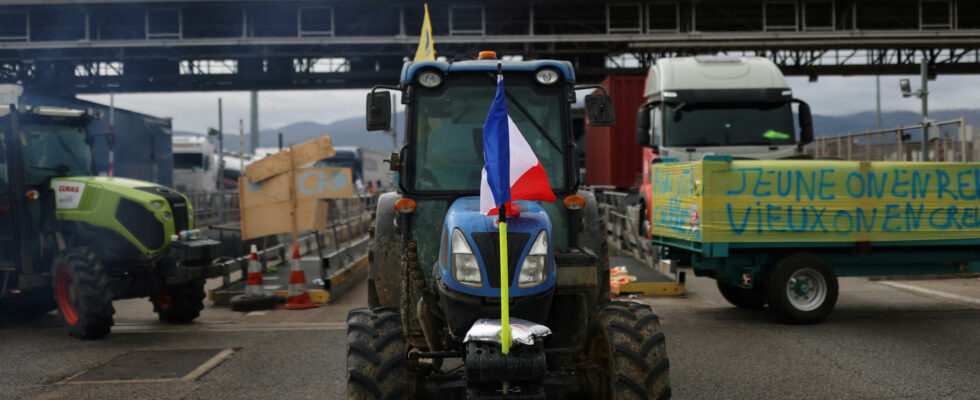In France, the angry movement of farmers is entering its second week. The farming world is up in arms against the possible signing of a free trade agreement between the European Union and the Mercosur countries in Latin America. Contrary to what we observed a year ago, the movement remains for the moment rather confined to French farmers. This week there will be actions in all French departments. The main unions are increasing calls for mobilization.
4 mins
After a first week of mobilization against the free trade treaty that the European Union is negotiating with Latin American countries in Mercosuractions should extend to the denunciation of “obstructions” to production denounced by the majority alliance FNSEA-Young Farmers (JA) as well as by its competitor Rural Coordination (CR), the second agricultural union.
The president of the FNSEA Arnaud Rousseau announced new actions with the JA “ Tuesday, Wednesday and Thursday ” For ” denounce the obstacles to agriculture and everything that today constrains our activity “. After symbolic actions – fires of anger, rallies – claimed in 85 departments, the actions will target, for example, prefectures, water agencies or the office of the French Office for Biodiversity (OFB). “ Almost all departments plan to take action within the next few days », warned the JA.
Also readFrance: angry farmers call on the government to “keep its promises”
Sunday, November 24, in the morning, 37 farmers with nine machines mobilized during two actions, according to the authorities, who clarified that no incident was to be deplored.
Following the credo of the FNSEA – “ No ban without solution » -, the demonstrators will notably defend the return of acetamiprid, an insecticide from the neonicotinoid family, demanded by hazelnut and sugar beet producers. Harmful to pollinators, it is banned in Francebut used in other European Union countries. They also demand increased access to water and the simplification of the millefeuille of French and European standards, deeming the efforts made by the government still insufficient.
Highlights of Rural Coordination
The Rural Coordination, which has multiplied the outbursts in recent days, plans “ to amplify » its mobilization beyond the South-West where its actions have been concentrated in recent days.
After a filter dam on the Spanish border, the blocking of the commercial port of Bordeaux or a muscular intrusion into an office of the OFB, of which he requests the “ dissolution “, the union plans a rally on Tuesday in front of the European Parliament in Strasbourg, but also an operation to clean ditches in the Hautes-Alpes and the continuation of the blocking of distributors’ purchasing centers.
Opposed for decades to free trade, the Peasant Confederation, heir to the anti-globalization peasant struggles, continues its mobilizations against Mercosur and “ for the defense of peasant income » and the agroecological transition. She plans in particular a mobilization in a supermarket in Essonne on Monday and an anti-Mercosur action in Dordogne on Tuesday.
Friday, November 22, tension suddenly rose between the FNSEA and the Rural Coordination, including around fifty members from its stronghold of Lot-et-Garonne disrupted a trip by Arnaud Rousseau to Agen. In an electric atmosphere, the activists in yellow hats booed the boss of the FNSEA and threatened to prevent him from leaving, before letting him return to his vehicle under police escort.
Union elections in sight
Battles that everyone therefore seems to be leading in their own corner, and for good reason: next January, farmers will be called upon to renew the Chambers of Agriculture and therefore to choose their representatives for the next six years. In 2019, the FNSEA, which has always been in the ultra-majority, and the Young Farmers, collected 55% of the votes.
Things could change in 2025, the Rural Coordination hopes to capitalize on a muscular mobilization and striking actions which have left their mark. The union defends more traditional agriculture, less productivist than the FNSEA and several of its executives have moved closer to the far right in recent years.
In 2019, she came neck and neck with the Peasant Confederation. A union classified on the left, perfectly aligned with the demands of farmers against Mercosur, less audible when it defends the need for more sustainable agriculture in an agricultural France still very marked by productivism.
Also listenAngry farmers: the agreement with “Mercosur is a drop that will break an already full vase”
